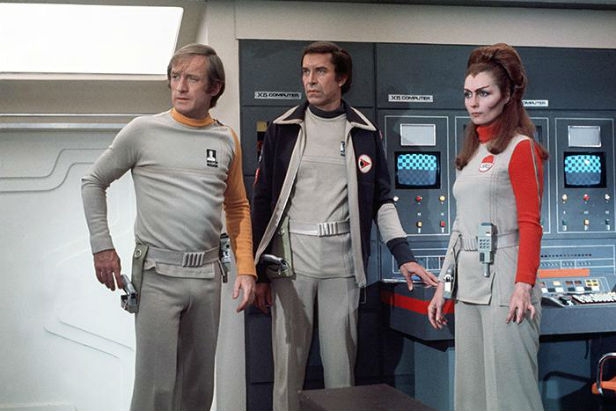Series 2 of Space: 1999 doesn’t have a very distinguished reputation among fans of 1970s SF TV, or even among the people who made it.
Creator/producer Gerry Anderson often admitted his disappointment with the changes wrought upon the grandest dramatic vision of his career (and the last, depending how charitably you view Terrahawks) by the show’s American backers, keen to recoup investments that made Space: 1999‘s first series in 1975 the most expensive British TV show ever made.
At the end of the first series, Gerry and Sylvia Anderson separated, both as spouses and creative partners. Her professional replacement, ex-Star Trek producer Fred Freiberger, was sent from the US to broaden the show’s appeal, developing it away from the downbeat, cerebral edge of Series One towards more conventional, cartoonish action-adventure. He also brought with him an abundance of cliches, plots and tropes familiar from his previous TV project.
The crew of Moonbase Alpha, cast adrift in space when the Moon was blasted out of Earth’s orbit by a nuclear explosion, continue their voyage across the universe, albeit more aimlessly than Year One led us to expect.
Martin Landau, as stolid, sceptical Commander Koenig, and Barbara Bain as resourceful, compassionate Dr Helena Russell, remained reassuring, resolute leads, but their on-screen relationship became unambiguously romantic, their blossoming love affair sweetly portrayed by the husband-and-wife acting team.
Landau and Bain are really the key to the show, nailing some charged interplay and well-judged, subtle performances, brimming with noble conviction and never overdoing it, however absurd the leaps of logic, however laboured the dialogue they’re called upon to sell us.
Several first series characters disappeared without explanation, while Catherine Schell joined the crew as Spock-ish new alien science officer Maya, who has the risibly convenient ability to transform herself into any living thing just by thinking about it. So she becomes an insect to crawl under a forcefield and an owl to fly over one, a tiger to see in the dark, a gorilla to help move heavy objects, an old hag (as a fun prank on her boyfriend Tony), a succession of rubber-suited aliens, and even bushes and rocks. In one disturbingly porny sequence she turns into Helena, prompting Koenig to work out which one’s which by giving them both a snog.
It’s clear why Freiberger felt the need to introduce an exotic female character, although with her brown ears, beaded eyebrows, ginger widow’s peak and top-to-toe nylon, Maya wasn’t exactly ‘something for the dads.’ Gerry Anderson was often first in line to ridicule Series Two’s more preposterous excesses, including Freiberger’s demand for more monsters; hence the sudden glut of laugh-out-loud rubber suits which made rather a mockery of the show’s initial all-time-high production values.
Gerry was also incredulous about Freiberger’s decision to name a planet after a place name that he spotted on an English road sign, that he felt sounded mysterious and alluring. Hence Space: 1999‘s all-time low-point, ‘The Rules Of Luton’.
Series One’s graceful, spacious Moonbase sets were gone, replaced with a claustrophobic interior that’s nevertheless so crammed with blinking multi-coloured lights, shiny analogue hardware and retro-futurist chic that after multiple episodes it becomes gently hypnotic.
Grotesque rubber monsters aside, the show still looks amazing, especially on Blu-ray; modelwork and special effects are often breathtaking, there are many imaginatively-realised planet surfaces and interiors, and the beautiful, vivid star-fields under the closing credits put subsequent Doctor Who end titles to shame.
It sounds great too, the subdued Barry Gray music of Series One replaced with Derek Wadsworth’s soundtrack of strident action-jazz, cosmic disco and eerie ambient.
The most frustrating aspect of Series Two is not that it’s bad – or even so bad it’s good – but that there’s a potentially great show underneath, struggling to assert itself. So many episodes contain solid concepts, cracking performances, compelling visuals and intriguing dialogue on weighty themes, but too often these are squandered by hastily simplistic resolutions, clunking plot holes, scripts that run out of steam or recycled Star Trek scenarios.
Sometimes a guest star raises the level. It’s hard to imagine ‘Brian The Brain’ succeeding with anyone but Bernard Cribbins giving voice to the eponymous unwieldy, garrulous computer; first we love him, then we hate him, then we feel sorry for him, but it takes an actor as endearing as Cribbins to invest this ludicrous boxy irritant with this rainbow of conflicting sympathies.
Perhaps Series Two’s finest hour, ‘The AB Chrysalis’ needs no such help, with a clear, tight storyline and refreshingly unorthodox depiction of an alien society. This and a few other strong offerings (such as the two-part ‘Bringers Of Wonder’) flag up chances that were missed elsewhere, but although it is frequently ponderous, compromised, nonsensical, frothy, hackneyed and badly thought-out, there are multiple compensations, and bags of entertainment value.
